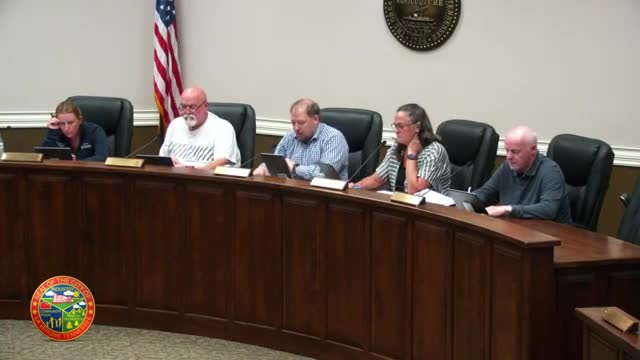La Verne presents 2025–26 budget first reading; no property tax increase and debate over police space, bonds
Get AI-powered insights, summaries, and transcripts
Subscribe
Summary
La Verne city staff presented the first reading of the fiscal 2025–26 budget at the May 6 workshop, keeping the property tax rate steady while raising the stormwater user fee $1 and increasing water and sewer rates per a rate study.
La Verne city staff presented the first reading of the fiscal 2025–26 budget at the Board of Mayor and Aldermen workshop on May 6, 2025, saying the proposal contains no property tax increase while raising the stormwater user fee by $1 and implementing water and sewer rate increases per the rate study.
City staff framed the budget as relying on a mix of carryover funds, existing bond proceeds and reserve draws. Bruce (staff member) summarized bond needs: “We are looking at a…$25,000,000 bond,” and said the city is proposing to transfer $2,000,000 into streets capital to cover next year’s estimated bond payment, which he described as “around 1,875,000.”
The budget discussion focused substantial attention on competing capital priorities: roadway improvements funded by existing bond proceeds versus space and evidence-storage needs for the police department. Aldermen and staff debated pausing or scaling back some office moves and architectural design work so bond coverage and road projects remain prioritized. One alderman urged reprioritizing “wants versus needs” toward infrastructure, while other council members and staff stressed immediate space problems for public safety.
Police and public‑safety leaders described current operational constraints and why space matters. Chief Beasley (Fire Chief) and a police representative explained evidence storage is overcrowded and lacks a drying room, creating challenges for evidence handling and prosecution. In describing the police needs, one staff member said an interim evidence area of “maybe 40 feet by 20 feet” would “double” current capacity and relieve pressure on the department while longer‑term plans proceed.
Staff outlined possible capital line items and funding sources in the packet: a $750,000 city‑hall remodel to free space, and a $2,000,000 line item for moving city offices into the public works facility; staff emphasized those amounts are estimates and that available funds come from existing bond issue balances, carryover and reserves.
No final budget vote occurred; the item was presented for first reading. Council members directed continued review of priorities, capital scopes and sequencing before a future public hearing and subsequent readings.
Ending: The board scheduled further budget work as part of the typical ordinance-reading process; staff said more detailed capital lists and personnel requests are in the packet for future consideration.
